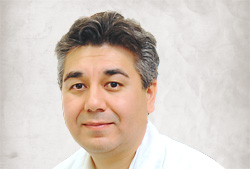
Dr. John Fleetham
Researcher, Sleep Apnea
Dr. John Fleetham has practiced respiratory and sleep disorder medicine since arriving in Vancouver in 1981. He is medical director of the Vancouver Coastal Health (VCH) Sleep Disorder Program and UBC Professor in the Department of Medicine. He was also until recently director of the VCH Research Institute Centre for Respiratory, Cardiac and Critical Care Medicine. Dr. Fleetham has published over 100 articles and 15 book chapters - the majority of on different aspects of sleep disordered breathing. He is also a long-time member of the BC Lung Foundation’s Medical Advisory Committee and a recipient of BC Lung Foundation research funding.
For more than 30 years, Dr. John Fleetham's specific research area of interest has been sleep apnea. He leads research investigating its causes, prevalence, consequences, diagnosis, and treatments.
Why study sleep?
The secret to a long and healthy life are three things: good diet, good exercise and good sleep. People tend to focus on the first two, but don’t focus on the last one, and yet sleep is very important to good health.
What happens when we don’t get enough sleep?
Lack of sleep can have minor side-effects like increased irritability, decreased ability to focus and may leave you prone to sickness. Likewise, it can also be deadly. For example, if you take healthy individuals and deprive them of sleep, say have them sleep only four hours per night for a week or so, their physiology becomes quite abnormal. They’ll start to become glucose intolerant, their blood pressure will go up, as will their stress hormones and inflammatory markers. Many of these symptoms are risk factors for heart disease. Our brains also need sleep to function. If you took healthy individuals and kept them up all night and had them do various cognitive tests, after 24 hours of continuous wakefulness, their performance is similar to that of someone who’s legally intoxicated. Left untreated OSA can give rise to diabetes, high blood pressure, and heart disease. It also increases the risk of motor vehicle accidents and work-related injuries.
And what exactly is sleep apnea?
The word apnea means no breathing. Sleep apnea is a disorder in which a person repeatedly stops breathing during sleep for an average of 10 to 30 seconds, sometimes hundreds of times per night. OSA (obstructive sleep apnea) is the most common form of sleep apnea and occurs when the upper airway becomes partially or completely blocked by soft tissue.
Do a lot of Canadians suffer from sleep apnea?
About three per cent of Canadian adults have OSA and the figure jumps to five per cent for Canadians 45 years old and up. Twice as many men as women have OSA and 26 per cent of Canadian adults report the presence of at least three symptoms or risk factors for OSA such loud snoring, daytime sleepiness, high blood pressure, and being overweight. Compared to the general adult population, Canadian adults who reported being diagnosed with sleep apnea were: 2.5 times more likely to report having diabetes, 1.8 times more likely to report hypertension, 2.2 times more likely to report heart disease; and 2.2 times more likely to report a mood disorder such as depression.
How does one get diagnosed?
A visit to your family doctor is the first step. You’ll likely be referred you for further testing. Thanks to research over the past 20 years, we have been able to simplify the process of diagnosis. We used to always do overnight sleep monitoring, but now, in many cases, we can use portable methods. In other words, we can send you home with a sleep monitoring device as opposed to always requiring an overnight stay in a sleep lab.
Is there treatment for sleep apnea?
Yes, that is what is so encouraging with sleep apnea. There is help; proven treatments. If you are diagnosed with OSA, the most common form of treatment is the Continuous Positive Airway Pressure (CPAP) machine, which supplies a constant, steady air pressure through a mask or nose piece. Other treatment options for sleep apnea include behavioural treatments such as weight loss, avoidance of alcohol and sedatives, and oral or dental appliances to re-align the oral cavity.
